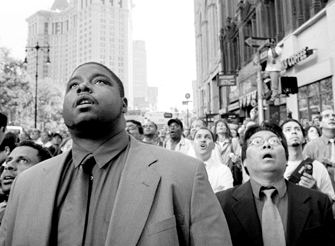Law In the Age of Terror

New Yorkers watch the World Trade Center fall. Photo by Patrick Witty
Six years after the terrorist attacks of Sept. 11, 2001, much of the legal system’s role in the war on terror remains unresolved.
Should the courts take a backseat to the executive branch, as they have historically done during wartime? Or, in this new kind of conflict—with no hope of a discernible, state-sanctioned end—should the courts hold the executive branch as accountable as they would in peacetime?
Neither view seems likely to win out. Rather, we seem to be stumbling toward a third way: building, bit by bit, a new paradigm of the law of terror—defining the limits of executive power, civil liberties, defendants’ rights and the independence of the judiciary with a system that borrows from the law of both wartime and peacetime.
Since 9/11, this process of discovery has played out in hundreds of cases, litigated by thousands of lawyers. This special issue examines how the legal system has changed and profiles the lawyers who have been at the center of the defining legal controversy of our time.
Write a letter to the editor, share a story tip or update, or report an error.


